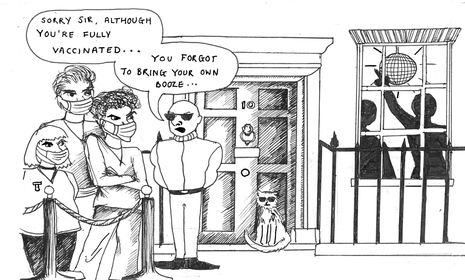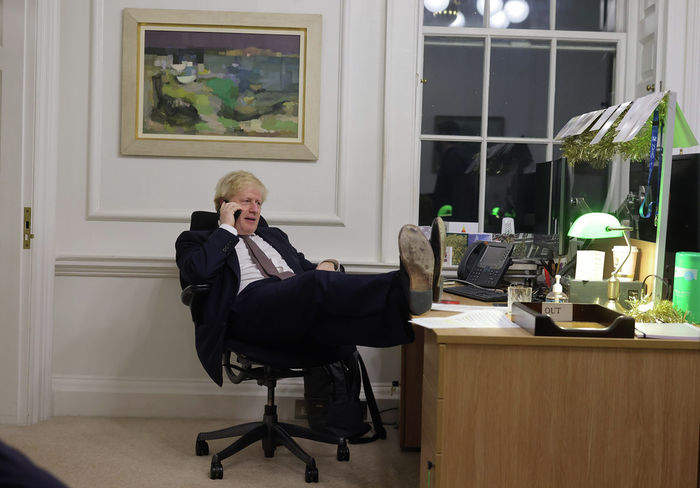Actually, Partygate is good for democracy
Deputy Opinion Editor Hugh Jones argues the criticism of the government sparked by the Partygate scandal has helped reinforce our democracy

In recent weeks, it has become fashionable to suggest that “partygate” has undermined our democratic processes. Even Sajid Javid, the Health Secretary, and someone who is supposed to downplay the government’s missteps, acknowledged that “Of course things like this damage our democracy”.
I, however, am not quite convinced that this is true. Or rather, the English student in me cannot resist nit-picking Javid’s exact word choice, and what it implies. To say that partygate has damaged our democracy is to suggest either that our democracy was better before the scandal broke, which seems wholly implausible (bad things aren’t bad just because the public find out about them), or that the parties themselves were damaging, which is probably what Javid, and the various other commentators making a similar point, meant. Nonetheless, this formulation, while more reasonable, still strikes me as flawed.
“The Johnson ministry has been riding rough-shod over these rules since Boris first moved into Number 10”
Partygate, at its most fundamental, represents a violation of the rules which govern our political system. This sounds very bad until you realise that the Johnson ministry has been riding rough-shod over these rules since Boris first moved into Number 10. In his two-and-a-half years in office, Johnson has threatened to violate international law over conditions in Northern Ireland created by the very Brexit deal he successfully campaigned on in 2019, refused to fire Priti Patel when she was found to have broken the ministerial code, and shown consistent disrespect for Parliament, most notably by seeking to prorogue it at the height of tensions over Brexit. The move was later ruled unlawful by the Supreme Court on the grounds that it had frustrated Parliament’s constitutional role.
Given that Johnson, and various members of his government, have been willing to undermine the constitution so blatantly, that they almost certainly broke lock-down rules is hardly surprising. In fact, in the context of Johnson’s other misdeeds, it is hard to claim that the damage to our democracy was done by cheese and wine, rather than, say, trying to silence our elected representatives. Partygate is not damaging in itself, but rather it is a symptom of damage which has already been done, and which will continue to be done if Boris survives the current threats to his premiership.
Partygate was, however, deeply damaging to the government. Whether it brings Johnson’s tenure to an end remains (at the time of writing) to be seen, but what is notable is that Johnson’s rule-breaking has finally caught up with him in a serious way. This is why I think that the partygate scandal has been, in itself, really rather good for our democracy. After years of Downing Street playing fast and loose with our constitution, they are finally realising that it fights back. The British constitution isn’t a piece of paper, or any single law. Even the whole statute-book cannot cover it, because it also includes conventions, traditions, and principles. Throughout his time in office, Johnson has cared about these the least. Courts, and ultimately the police, in extremis, can and will enforce legislation. But Johnson seems to have thought that conventions – like firing ministers who break the ministerial code – are the optional extras of government, vague bits of rhetoric and idealism to be occasionally employed in soundbites, but to be ignored if they present the slightest bit of friction to his policies.
“The fact that all of us are free to call our Prime Minister incompetent and spineless is really quite a beautiful thing”
What Johnson is now learning is that conventions and principles exist for a reason, and that even the most powerful person in the country neglects them at their peril. In this country we have the freedom of speech and of the press, they are written into the fabric of our democracy, and no matter how much Boris bashes the BBC and the right to protest, people will make use of these freedoms if they feel moved to do so.
When the partygate scandal broke, suddenly a very substantial number of people felt very moved indeed. Boris has been mercilessly caricatured, mocked, and disparaged in every sphere of public life; from social media to the high street, via I’m A Celebrity, Britons have not just been speaking truth to power. We as a nation have been pointing and laughing at the most powerful man in the country, who has been unable to do anything about it. Moreover, our institutions have been taking advantage of Johnson’s weakness to reassert their independence and to win important battles for the principles he has neglected or undermined – most notably when the House of Lords gutted the Government’s authoritarian police and crime bill. Even the Cabinet Office inquiry under Sue Gray seems to have fought back against the threats to accountability posed by the Met’s ill-considered decision to not only investigate the allegations criminally, but to request that the Gray report be redacted in the process. By issuing an utterly scathing “update”, she struck a blow for responsible government – and underscored the importance of independent institutions.
That any of this is necessary is obviously a problem in itself. But as Hong Kong’s free press crumbles under Xi Jinping’s jackboot, Russia continues to imprison dissidents, and protests are crushed with tanks in Kazakhstan, the fact that all of us are free to call our Prime Minister an incompetent, spineless, shamelessly grasping and deeply corrupt man who is hopelessly out of his depth, is really quite a beautiful thing indeed, and if partygate has encouraged us to do so then, well, I’ll drink to that.
 News / Downing investigates ‘mysterious’ underground burial vault 29 December 2025
News / Downing investigates ‘mysterious’ underground burial vault 29 December 2025 News / Unions protest handling of redundancies at Epidemiology Unit30 December 2025
News / Unions protest handling of redundancies at Epidemiology Unit30 December 2025 Lifestyle / Ask Auntie Alice29 December 2025
Lifestyle / Ask Auntie Alice29 December 2025 Features / ‘Treated like we’re incompetent’: ents officers on college micromanagement30 December 2025
Features / ‘Treated like we’re incompetent’: ents officers on college micromanagement30 December 2025 Science / Astronomical events to look out for over the break29 December 2025
Science / Astronomical events to look out for over the break29 December 2025










